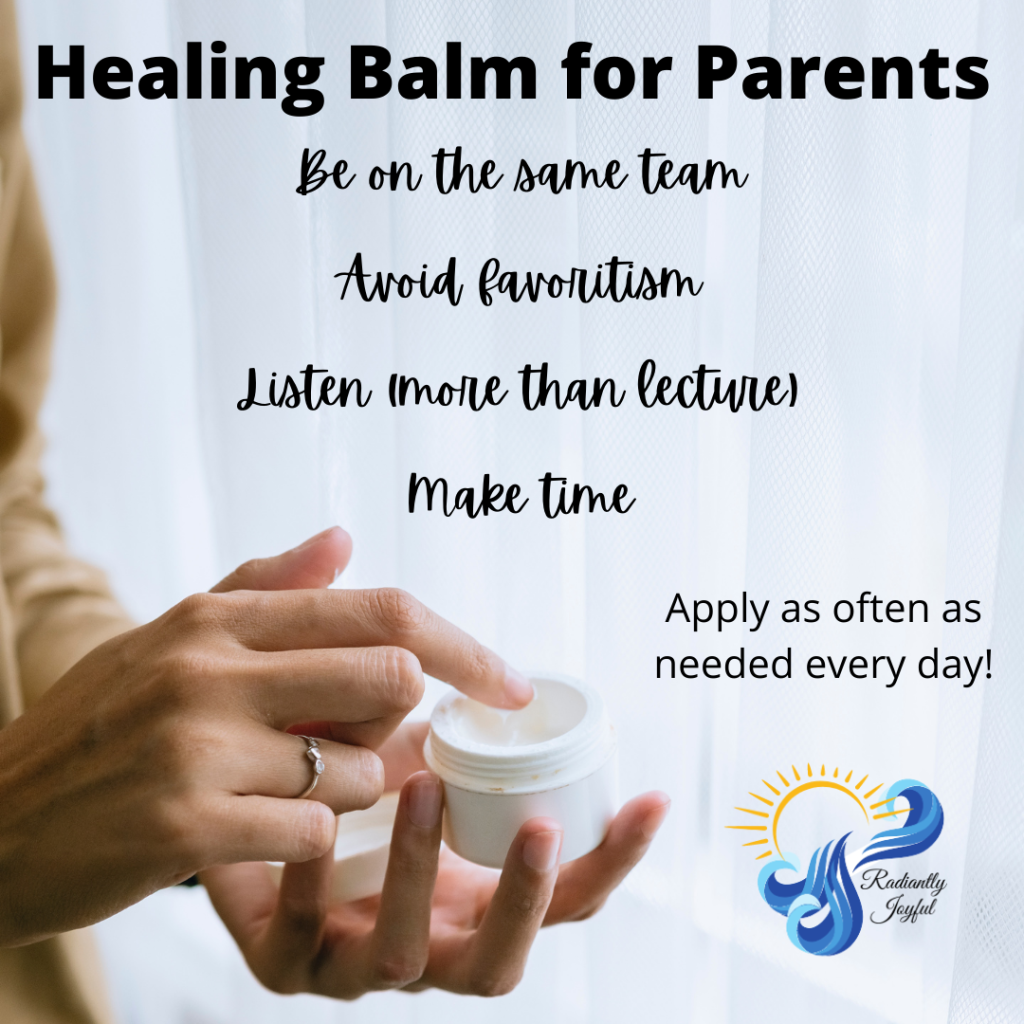Healing for Parents
My biggest goal each year is reading through the Bible. Thanks to the YouVersion app, I can do this with friends all over the world. This year, we’re reading through the Bible chronologically. As we read through Genesis, I noticed some recurring themes in the book related to parenting. As I studied these examples, I came up with an acronym to guide us in restoring healthy relationships in our families.
A balm is a comforting, soothing, restorative ointment. This topical treatment often has a fragrant and uplifting aroma. In other words, it’s medicinal for both the mind and the body.
When we meet our spouse and fall in love, the “us against the world” stance is easy. Nothing is more important than our spouse. We want to do everything we can to please each other and preserve peace. After some time, the honeymoon ends and we “forget” to make this effort.
When children are added to the family unit, they tend to get all of the focus. While children need attention, love, and guidance, they are not the focus of the marriage. Many difficulties in the home start when parents neglect their relationship with each other. This allows favoritism, manipulation, and neglect to occur in the family. To get back to what is better, apply this BALM multiple times a day.
- Be on the same team with your spouse. Initially, when a child asks one parent and then another, he/she may not mean much harm. However, it’s still manipulation. Children need to know that the parents are a team. What mom says, dad supports – and vice versa. If there is an issue where one parent doesn’t agree, this discussion should NOT happen in front of the child. Be on the same team. Discuss different scenarios and your responses to them.
- Avoid favoritism. This caused so many problems in the book of Genesis (and continues to do so in today’s families). Abraham preferred Isaac. Isaac and Rebekah each had a favorite child. Jacob preferred Rachel and her children, over the rest of his family. Favoritism in families only leads to hurt feelings and conflict. While every child is different, every child needs love and discipline. The method for each child may vary, but one should not be given more importance than another.
- Listen (more than lecture). Listen to the silly stories, the endless chatter, and the childish concerns. Listening when children are young gives them the courage to continue the conversation as they grow. Because I listen to the mundane, my children feel safe asking big questions. I don’t shut them down or shy away from tough things. (I am still working on lecturing less).
- Make time, no matter how “busy” you are. Make time for your marriage (away from the children). Make time for each child individually. Make time for family togetherness. Pray together and play together.
Above all, remember that God created marriage and designed families. He intends these relationships to be a blessing in our lives, not a source of pain. Invite God into your home and see the diffence His presence makes in every relationship.
**Disclaimer: This does not apply to families in which abuse is happening. Safety is more important than preserving relationships in the case of abuse. Abuse is not limited to physical harm. If you or someone you know is in a situation where they need intervention contact the National Hotline: 800-799-7233.

Thank you. It’s truly a labor of love. The toughest and best job ever.
Your dedication to providing a loving and nurturing environment for your family is admirable.
The joy is all mine!
CommentYour blog on ‘Healing for Parents’ is a profound source of compassion and wisdom. The way you navigate the complexities of parenthood with empathy and understanding truly shines through your words. Your insights provide a comforting guide for parents seeking healing, fostering a sense of community and reassurance. Thank you for creating a space that not only acknowledges the challenges but also offers genuine support and encouragement.
I’m glad you found it useful! Feel free to share it with others in need of such encouragement.
I truly appreciate the insight and care embedded in this post from January 16, 2022. It’s a reminder that parents need healing and support too. Kudos to the author for addressing this important aspect of parenting and offering valuable information to help parents find their path to healing.
I’m so glad you found encouragement from this post!
Thank you for sharing these valuable insights, and the BALM acronym is a great reminder of how to maintain healthy family relationships. Putting your spouse first and avoiding favoritism are essential for a harmonious family. Your dedication to reading the Bible and applying its teachings is inspiring.
I’m glad you enjoyed it!
I agree with every factor that you have pointed out. Thank you for sharing your beautiful thoughts on this.